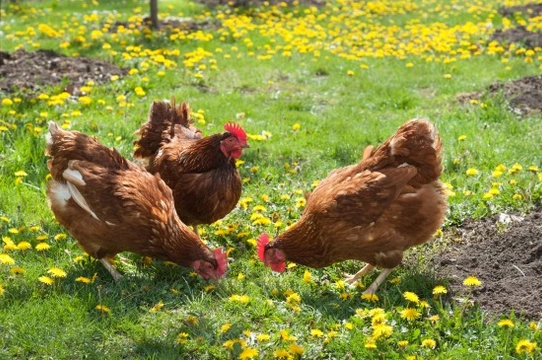
Keeping Chickens on a Budget
Keeping a few chickens in the garden is lots of fun because they are highly amusing characters. However, if you are worried it might prove too expensive to keep four or so hens, think again because if you are clever and careful, keeping a few chickens can work out very inexpensive all round.
Biggest Expense is Housing
Obviously, the biggest expense is going to be where you house your birds, but even this can be done on a very tight budget. The simple solution is to build something yourself. Most gardens have sheds in them so if you can convert part of a shed for your hens to live in, all the better.
Chickens don't need lots of room to roost in at night, but they do need space to move around in when the weather is too bad for them to go outside. The solution is to build a small covered extension on the shed with a cat flap type opening for your birds to get in and out of.
Old drawers make perfect nesting boxes and are easy to pick up from junk shops for very little money especially if the shop owner is only going to throw them away or burn them. When it comes to perches, these can be made out of any lengths of wood but they need to be flat and not round because hens have real trouble gripping on anything that's rounded. A flat plank around five inches wide makes the perfect perch because your birds can lay their chests on them making it more comfortable for them to sleep on.
An Old Caravan Makes a Great Chicken Coop
If you live in the country, one of the best ideas for a chicken coop is an old discarded caravan. All that's needed is to empty out the soft furnishings, add a few well placed perches, the nesting boxes are already in place once you remove any cupboard doors! The best part is you can walk in the caravan to clean it out which makes life a whole lot easier when it comes to keeping everything hygienic in your coop.
The other great thing about using an old caravan, is that the ventilation is good and if necessary you can open the smaller windows when necessary during the warmer weather without the fear of any predators getting into your coop. Good ventilation is important to the well being and overall health of your birds, even during the colder winter months.
Free Range Your Hens
To cut your feed bill down, free range your hens, but there is a bit of a downside to this because of the predator problem. If you have good fencing around your property, this is not such a problem, but you need to take this into consideration if you want to keep your hens safely out of the reach of foxes and larger birds of prey.
Chickens find all sorts of tasty things to eat when they are scratching around in the dirt and as such do not need much in the way of extra feed apart from in the winter time when the ground is frozen. During the warmer months, throwing down a little mixed grain should be just to supplement what they find for themselves.
Building a Secure Run on a Budget
If you cannot free range your chickens, then consider building a large run for them to scratch around in during the day. Again, you don't have to spend a fortune because you can build the run onto an existing fence using recycled wood. You do have to make sure no predators can dig their way in to the run which means digging in some wire mesh around the base of the fencing.
How to Keep a Winter Feed Bill Down
Chickens will eat just about anything and everything which means they are great at getting rid of a lot of your kitchen scraps, especially the veggies, fruit, pasta and even some meats and fish although you must never give your birds any chicken based goodies from the kitchen!
By feeding your birds lots of scraps, it will help keep your winter feed bill down and it also adds a lot of diversity to an otherwise boring diet. The extra vitamins and nutrients this provides for your hens will help them get through the colder weather and keep their immune systems nice and strong to boot.
Keeping Your Feed Stock Stored in a Dry Environment
To cut your feed bill down even further, buying chicken food in bulk will save you quite a few pennies. However, you need to store the bags in a nice dry and rodent-free place to prevent it from spoiling. Old dustbins make great feed bins and the larger they are the better. Rats and mice can't get in and neither can any moisture which would cause the feed to go mouldy and therefore unsuitable to feed to your birds.
Conclusion
You don't have to spend a fortune on keeping chickens and the fact you don't have to buy eggs helps pay for any feed you do need to buy during the colder winter months. Mixed grain, layer mash or pellets should only be given as a supplement to what your hens find for themselves to eat. However, if you are counting on having lots of eggs, you may need to supplement their diet with bought in feed which would encourage your birds to lay more!



